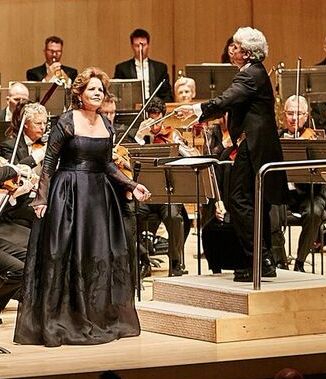 Soprano Renee Fleming with the TSO. photo: Dale Wilcox.
Soprano Renee Fleming with the TSO. photo: Dale Wilcox. The star in question was soprano Renée Fleming, who brought with her an assortment of musical bon-bons: songs and arias by Ravel, Rossini, Tosti, Donaudy, Leoncavallo, and Rogers and Hammerstein.
It’s no secret that the 57-year-old soprano is winding down her stage career. In the current opera season, she’ll sing the role of the Feldmarshallin in Strauss’s Rosenkavalier at the Met and Covent Garden. Then, she has announced, she will forsake the opera house, but continue her concert career.
However, as her performance with the TSO revealed, there may be vocal reasons why Fleming’s decision to bow off the opera stage is well timed. In Ravel’s Schéhérazade – the biggest piece on the program – her voice had the purity and precision we’ve come to expect. But even with Oundjian doing his best to mute his orchestra, Fleming’s voice sounded small and submerged, lacking brightness and energy.
It was in two famous Puccini arias – “Sì, mi chiamano Mimì” and “O mio babbino caro” (sung as an encore) – that the sumptuous beauty of Fleming’s voice was fully revealed. No doubt, she has sung these arias more times than she can count, yet on this occasion they were fresh and vital. I also heard flashes of Fleming at the top of her game in her sparkling performance of Leoncavallo’s “Mattinata” and her lush and elegant rendition of Donaudy’s “O del mio amato ben.”
Broadway musicals have long been a staple of Fleming’s repertoire – which, no doubt, endears her greatly to American audiences. And I suppose there are good arguments, based on “authentic performance practice,” for Fleming’s use of a microphone in the selections from The King and I that she chose for this program. But could she not have done without? Could we not have heard the real Fleming here – instead of a version of her voice rendered into magnetic-electrical impulses used to vibrate a loudspeaker?
As for the orchestral aspects of the concert, there’s not much that needs saying. Ravel’s Alborada del gracioso (which opened the program) went well – with a lively tempo set by Oundjian, and a lively response from his players. The overture to Rossini’s La scala de sieta (following the intermission) was a feather-light piece, given a feather-light treatment. And for some inexplicable reason, Oundjian decided to include an even more insubstantial snippet: “Touch Her Soft Lips and Part,” from William Walton’s music for the film Henry V.
All considered, this concert was more like a posh reception (with sweet little cakes and cookies, and one of those chocolate fountains) than a real meal. I look forward to hearing the TSO sink its teeth into more substantial fare as the season progresses.
© Colin Eatock 2016
 RSS Feed
RSS Feed

